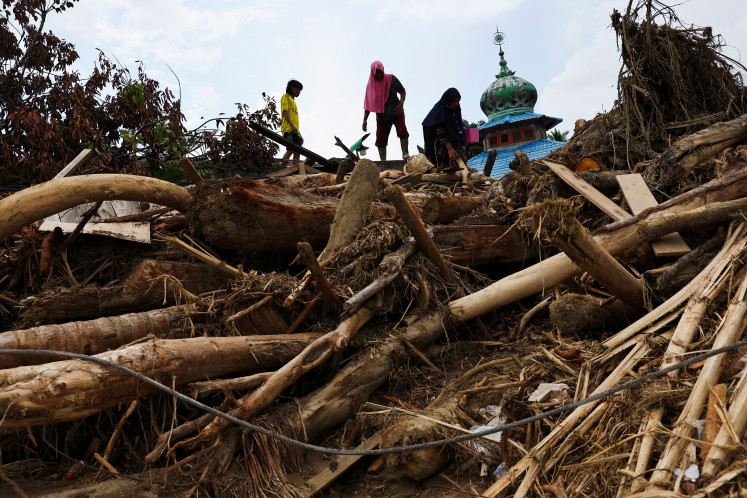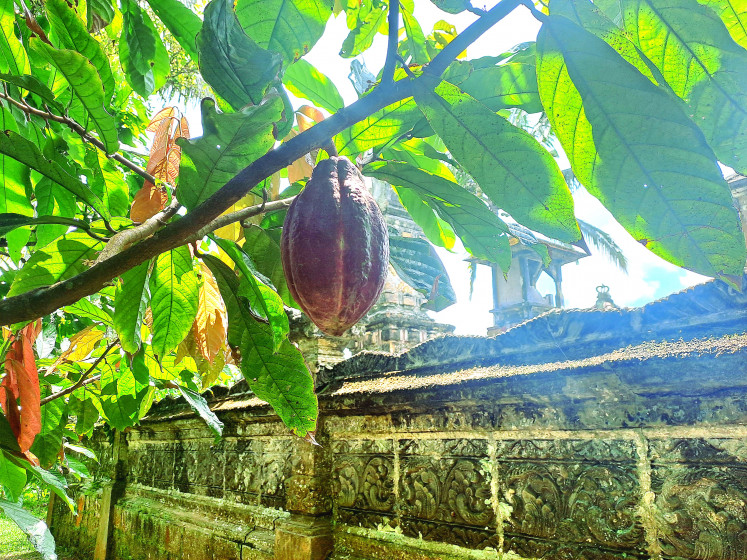Popular Reads
Top Results
Can't find what you're looking for?
View all search resultsPopular Reads
Top Results
Can't find what you're looking for?
View all search resultsPresident passes the buck on high-speed rail project
The widely publicized tug of war between Japan and China over a high-speed railway project in Indonesia may end in an anticlimax, with President Joko âJokowiâ Widodo set to let the State-Owned Enterprises Ministry decide the winner for the nationâs first-ever high-speed rail project, connecting Jakarta with Bandung in West Java
Change text size
Gift Premium Articles
to Anyone
T
he widely publicized tug of war between Japan and China over a high-speed railway project in Indonesia may end in an anticlimax, with President Joko 'Jokowi' Widodo set to let the State-Owned Enterprises Ministry decide the winner for the nation's first-ever high-speed rail project, connecting Jakarta with Bandung in West Java.
'We need high-speed rail and the development of the Indonesian railway [industry]. But we don't want to burden our state budget, so I have decided that the project will not be funded by the state budget,' Jokowi said during an impromptu visit to Cilincing, North Jakarta, on Thursday.
'There won't be any government guarantee, so I'm handing [this matter] to the state-owned enterprises ministry to organize a business-to-business [scheme],' he added.
The competition between the Asian heavyweights vying to build the rail link is heating up, the government initially having promised to announce the winner this week before later delaying the announcement until Sept. 7.
'The state budget should be used for trains in Sulawesi, Papua or Kalimantan, but the State-Owned Enterprises Ministry should be responsible for investment like this,' the President emphasized.
While Japan's proposal requires a viability gap fund from the government, China's stipulates no usage of state funds, although the government could be involved through a consortium of state-owned enterprises.
Jokowi deferred further questions on the bid to Coordinating Economic Minister Darmin Nasution and State-Owned Enterprises Minister Rini Soemarno.
Darmin said separately that he had submitted a recommendation regarding the project to the President.
'We have reported it to the President. But he asked us to let him announce it,' he said, adding that the President would explain the government's decision in detail, though declining to say when.
Darmin met with Jokowi to submit the recommendation at the Presidential Palace on Thursday following a meeting on Wednesday between related ministers and independent consultants Boston Consulting Group.
Previously, Rini said that if her ministry were given the authority to decide the project winner, she would opt not to involve the state budget.
'All investment should come from a consortium of state enterprises in partnership with the winner,' Rini told reporters, adding that the consortium would comprise state-owned construction company PT Wijaya Karya, railway operator PT KAI, toll operator PT Jasa Marga and plantation company PTPN VIII.
Transportation Minister Ignasius Jonan concurred, saying that the limited state budget would be better used constructing railways in regions outside Java.
Public policy observer Agus Pambagyo, however, said that the government should instead have canceled the project, saying it was not in line with the government's Nawacita program.
Agus, quoted by a local news organization, argued that the financing schemes offered by both China and Japan would eventually burden the state budget.
The Japan International Cooperation Agency (JICA) estimates the project to cost around US$6 billion, with 74 percent of the cost funded by a new state-owned enterprise that would operate the rail network and the remaining 10 and 16 percent of the cost sourced from the state budget and the private sector, respectively.
The Chinese proposal, on the other hand, forecast that $5.5 billion would be required for the project in partnership with state enterprises. (prm)










